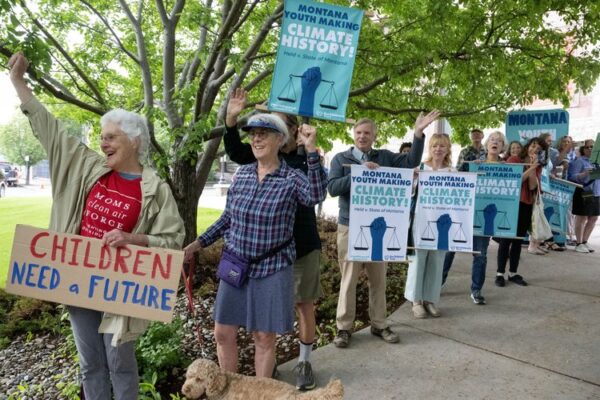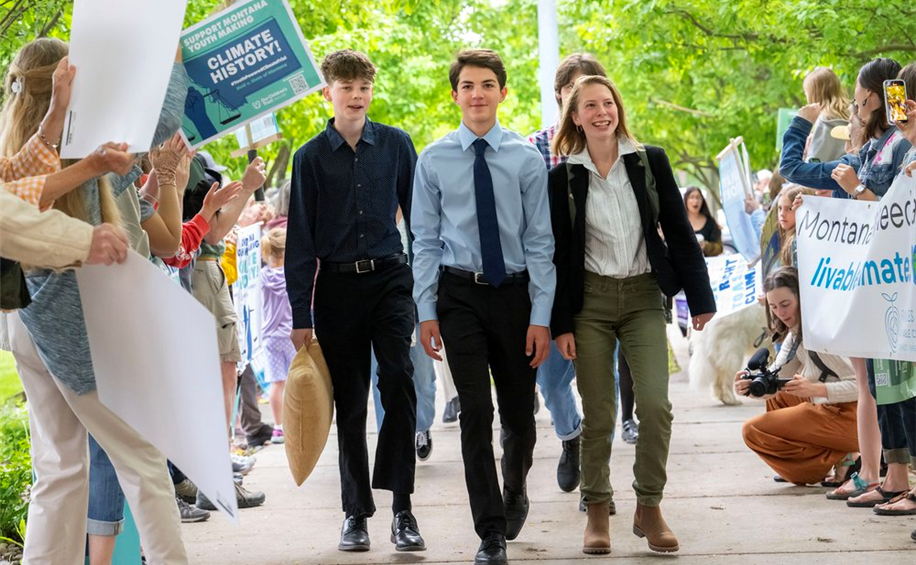As the courtroom seats began filling in the first judicial court in Helena, the capital city of Montana, local community members and officials prepared to hear the long-awaited testimonies from plaintiffs who allege state officials have violated their constitutional right to a “clean and healthful environment.”
The historic trial marks the first-ever constitutional climate trial in the U.S., beginning June 12th and concluding on the 20th with a ruling expected to come out in several weeks. For the 16 plaintiffs who originally filed the case in 2020, this has been years in the making. Aged 2-18 at the time of filing, this case represents a new era of the climate fight led by a youth who wants a cleaner and greener future for themselves. And are not afraid to fight for it.
Speaking on the opportunity to represent her community and livelihood plaintiff Grace Gibson-Snyder, 19, expressed:
“Going to trial means a chance for me and my fellow plaintiffs to have our climate injuries recognized and a solution realized. It means our voices are actually being heard by the courts, the government, the people who serve to protect us as citizens and Montana’s youth.”
During the trial defendants aimed to deflect responsibility with the age-old argument that Montana by itself cannot have an effect on climate and thus cannot be solely accountable, emphasizing that fossil fuels are a global concern.
While the problem extends further than Montana, in 2019 the total annual fossil fuels extracted in Montana and CO2 released into the atmosphere equated to more than the economies of Brazil, Japan, Mexico, and Spain. The global scope does not excuse the state of Montana from being held accountable for its role in perpetuating the climate crisis.

Photo by Robin Loznak on Youth v. Gov.
“The defendants argue that Montana’s greenhouse gas emissions don’t matter, but irrefutable expert testimony affirms that Montana’s emissions are substantial. The impacts of Montana’s emissions are both local and immediate as well as global and long-lasting,” explained Nate Bellinger, Senior Staff attorney representing the plaintiffs alongside nonprofit law firm Our Children’s Trust.
During the trial, the court was flooded with local, independent, and national media including Montana Free Press, The Guardian, NPR, The Independent, and Democracy Now, among others. The case has even garnered the attention, no matter how brief, of outlets such as Reuters, Billings Gazette, CBC News, and CNN. But what’s been missing from mainstream narrative reports were the attempted blocks from the U.S. Department of Justice to try and stop the trial from taking place.
While the trial is a historic moment for the climate fight and has garnered a global audience, it’s vital that the truth of the opposition the trial has faced be shared — especially when coming from the government. A week prior to the trial’s commencement, the state of Montana filed an emergency petition to halt the trial and take supervisory control of the case, which was denied.
The Biden Administration is now faced with a choice. It can either uphold the writ of mandamus, a formal legal document from a court to an inferior government official or body compelling them to legal action, which was invoked under President Trump; or drop the opposition to give plaintiffs a fair shot at judgement.
During this ongoing opposition, more than 250 groups have signed and delivered a petition to Attorney General Merrick Garland demanding the Department of Justice drop its opposition to the youth climate lawsuit.
This case highlights a new era of action. Climate change is not simply a global issue but encompasses the affirmative efforts of governments that create and exacerbate the effects of global warming. Governments damage local environments and livelihoods when they partner with industries like big oil instead of their communities.
On what this trial will mean for the future of climate litigation, Jonathan Adler, an environmental law professor at Case Western University commented, “It really pushes the boundaries of what courts are capable of and effective at addressing.”
Header photo by Robin Loznak on Youth v. Gov.

